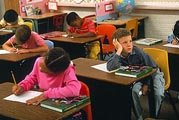How many ADD kids does it take to turn on a light bulb? Let’s go ride bikes. This joke, among others, is just one ADD punch line. Many people who have ADD (including yours truly) join in on the jokes from time to time. But ADD also has a serious side, one that many people are unaware of.
ADD (Attention Deficit Disorder) is a neurological condition that affects five to ten percent of Americans. It usually starts in childhood, and in some cases it is outgrown by adolescence.
In addition to finding it hard to pay attention, people with ADD often tend to daydream and may be disorganized, have a tendency to procrastinate, or often forget things.
“One of the most common misconceptions about ADD is that people aren’t paying attention”, said Kim Sellick, Guilford’s Alternative Learning Specialist. “In reality, they are paying attention …just to many things at the same time.”
Students with ADD often find that they have problems focusing, finishing assignments on time, organizing their schedule, and setting priorities. The study habits that worked for them in high school usually don’t work as well in college.
Over 40% of people with ADD also experience depression, anxiety, or obsessive-compulsive disorder. They may feel that their underachievement is their fault, and that things would be easier for them if they tried harder.
Students with ADD may try to compensate for their learning difficulties in school by being the class clown. Because of difficulties with planning and time management, students with ADD may find they don’t achieve as much as they want to, in both academics and social situations.
Medications prescribed for the disorder can help them with challenges in school.
Students who have ADD usually have other learning difficulties as well, often in reading, math (problem solving), note taking (having trouble concentrating on listening and writing at the same time), and retrieving words in language classes.
Recording for the Blind and Dyslexic (RFB&D) is an organization that helps many people who have ADD by providing tapes of their books, free of charge. Many students with ADD have trouble concentrating on reading, especially if the material is dense. These tapes often help students to read faster and understand more.
There are currently 91 students on campus with some form of ADD, and the Academic Skills Center provides a wide variety of resources to these students, including extended time on tests and books on tape.
Sellick and ASC Director Sue Keith are available to help students with or without ADD to find strategies to help them better organize their time.
Categories:
Learning disabilities and campus resources
Rebecca Muller
•
February 13, 2004

ADD, affecting five to ten percent of Americans, usually begins in childhood and is sometimes outgrown (www.tss.com)
0
More to Discover
